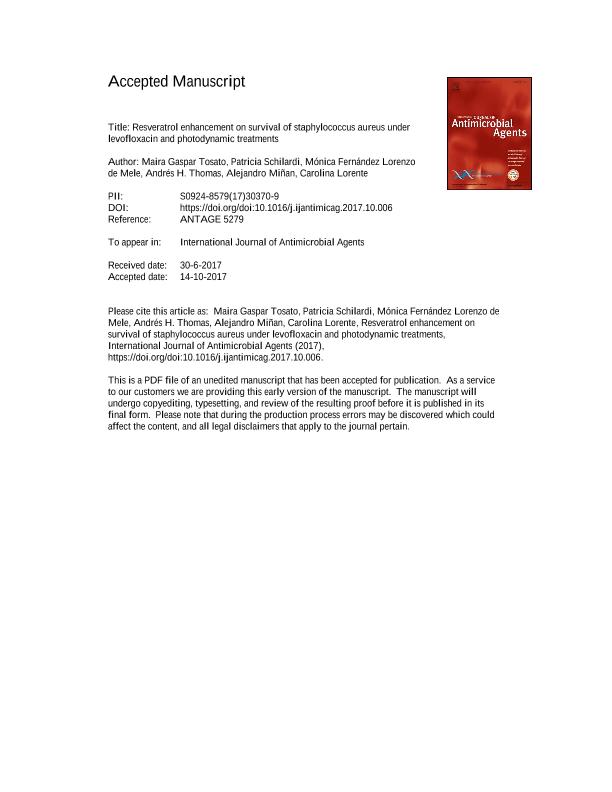Mostrar el registro sencillo del ítem
dc.contributor.author
Gaspar Tosato, Maira

dc.contributor.author
Schilardi, Patricia Laura

dc.contributor.author
Fernandez Lorenzo, Monica Alicia

dc.contributor.author
Thomas, Andrés Héctor

dc.contributor.author
Miñan, Alejandro Guillermo

dc.contributor.author
Lorente, Carolina

dc.date.available
2018-11-07T19:17:19Z
dc.date.issued
2017-10
dc.identifier.citation
Gaspar Tosato, Maira; Schilardi, Patricia Laura; Fernandez Lorenzo, Monica Alicia; Thomas, Andrés Héctor; Miñan, Alejandro Guillermo; et al.; Resveratrol enhancement staphylococcus aureus survival under levofloxacin and photodynamic treatments; Elsevier Science; International Journal of Antimicrobial Agents; 51; 2; 10-2017; 255-259
dc.identifier.issn
0924-8579
dc.identifier.uri
http://hdl.handle.net/11336/63923
dc.description.abstract
Reactive oxygen species (ROS) are an efficient tool to eradicate micro-organisms owing to the capacity of these species to damage almost all types of biomolecules and to kill cells. The increase in mechanisms of antimicrobial resistance has led to the exploration of new strategies to eliminate micro-organisms that involve the production of ROS such as superoxide anion (O2 •–) and hydrogen peroxide (H2O2). ROS are produced during several antimicrobial treatments, including antibiotic and photodynamic therapies. Among the natural antioxidants, resveratrol (RSV) is efficient at preventing damage from ROS, and every day more people incorporate it as a dietary or cosmetic supplement. However, the consequences of the administration of RSV during antimicrobial treatment are unknown. To investigate possible antagonistic or synergistic effects of RSV during antibiotic therapy (levofloxacin) or photodynamic therapy (visible radiation and methylene blue), killing of planktonic Staphylococcus aureus bacteria was evaluated in the presence of RSV. The results showed that the antimicrobial capacity of these therapies is significantly diminished when levofloxacin or methylene blue are co-administered with RSV, indicating that consumption of RSV during antimicrobial treatment must be, at least, cautioned. Moreover, considering the ROS antimicrobial activity of antibacterial agents, the topical addition of RSV may also affect the control of pathogens of the human body. The results presented in this article highlight the importance of the evaluation of possible antagonistic effects when an antimicrobial agent with ROS-mediated action is co-administrated with RSV.
dc.format
application/pdf
dc.language.iso
eng
dc.publisher
Elsevier Science

dc.rights
info:eu-repo/semantics/openAccess
dc.rights.uri
https://creativecommons.org/licenses/by-nc-nd/2.5/ar/
dc.subject
Antibiotics
dc.subject
Levofloxacin
dc.subject
Photodynamic Inactivation
dc.subject
Resveratrol
dc.subject
Staphylococcus Aureus
dc.subject.classification
Otras Ciencias Químicas

dc.subject.classification
Ciencias Químicas

dc.subject.classification
CIENCIAS NATURALES Y EXACTAS

dc.title
Resveratrol enhancement staphylococcus aureus survival under levofloxacin and photodynamic treatments
dc.type
info:eu-repo/semantics/article
dc.type
info:ar-repo/semantics/artículo
dc.type
info:eu-repo/semantics/publishedVersion
dc.date.updated
2018-10-22T22:32:16Z
dc.journal.volume
51
dc.journal.number
2
dc.journal.pagination
255-259
dc.journal.pais
Países Bajos

dc.journal.ciudad
Amsterdam
dc.description.fil
Fil: Gaspar Tosato, Maira. Consejo Nacional de Investigaciones Científicas y Técnicas. Centro Científico Tecnológico Conicet - La Plata. Instituto de Investigaciones Fisicoquímicas Teóricas y Aplicadas. Universidad Nacional de La Plata. Facultad de Ciencias Exactas. Instituto de Investigaciones Fisicoquímicas Teóricas y Aplicadas; Argentina
dc.description.fil
Fil: Schilardi, Patricia Laura. Consejo Nacional de Investigaciones Científicas y Técnicas. Centro Científico Tecnológico Conicet - La Plata. Instituto de Investigaciones Fisicoquímicas Teóricas y Aplicadas. Universidad Nacional de La Plata. Facultad de Ciencias Exactas. Instituto de Investigaciones Fisicoquímicas Teóricas y Aplicadas; Argentina
dc.description.fil
Fil: Fernandez Lorenzo, Monica Alicia. Consejo Nacional de Investigaciones Científicas y Técnicas. Centro Científico Tecnológico Conicet - La Plata. Instituto de Investigaciones Fisicoquímicas Teóricas y Aplicadas. Universidad Nacional de La Plata. Facultad de Ciencias Exactas. Instituto de Investigaciones Fisicoquímicas Teóricas y Aplicadas; Argentina
dc.description.fil
Fil: Thomas, Andrés Héctor. Consejo Nacional de Investigaciones Científicas y Técnicas. Centro Científico Tecnológico Conicet - La Plata. Instituto de Investigaciones Fisicoquímicas Teóricas y Aplicadas. Universidad Nacional de La Plata. Facultad de Ciencias Exactas. Instituto de Investigaciones Fisicoquímicas Teóricas y Aplicadas; Argentina
dc.description.fil
Fil: Miñan, Alejandro Guillermo. Consejo Nacional de Investigaciones Científicas y Técnicas. Centro Científico Tecnológico Conicet - La Plata. Instituto de Investigaciones Fisicoquímicas Teóricas y Aplicadas. Universidad Nacional de La Plata. Facultad de Ciencias Exactas. Instituto de Investigaciones Fisicoquímicas Teóricas y Aplicadas; Argentina
dc.description.fil
Fil: Lorente, Carolina. Consejo Nacional de Investigaciones Científicas y Técnicas. Centro Científico Tecnológico Conicet - La Plata. Instituto de Investigaciones Fisicoquímicas Teóricas y Aplicadas. Universidad Nacional de La Plata. Facultad de Ciencias Exactas. Instituto de Investigaciones Fisicoquímicas Teóricas y Aplicadas; Argentina
dc.journal.title
International Journal of Antimicrobial Agents

dc.relation.alternativeid
info:eu-repo/semantics/altIdentifier/doi/http://dx.doi.org/10.1016/j.ijantimicag.2017.10.006
dc.relation.alternativeid
info:eu-repo/semantics/altIdentifier/url/https://www.sciencedirect.com/science/article/pii/S0924857917303709
Archivos asociados
